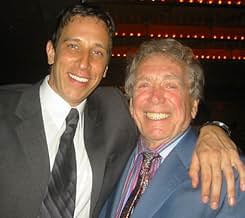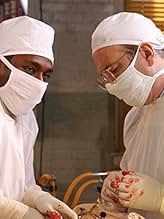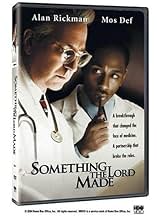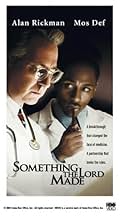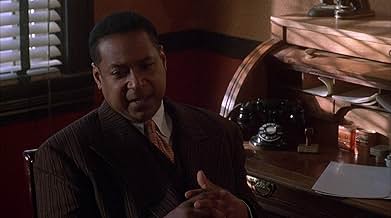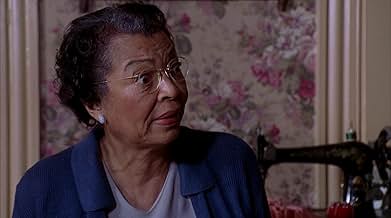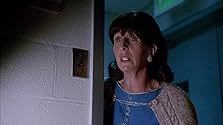IMDb-BEWERTUNG
8,1/10
16.632
IHRE BEWERTUNG
Füge eine Handlung in deiner Sprache hinzuA dramatization of the relationship between heart surgery pioneers Alfred Blalock and Vivien Thomas.A dramatization of the relationship between heart surgery pioneers Alfred Blalock and Vivien Thomas.A dramatization of the relationship between heart surgery pioneers Alfred Blalock and Vivien Thomas.
- Regie
- Drehbuch
- Hauptbesetzung
- 3 Primetime Emmys gewonnen
- 17 Gewinne & 32 Nominierungen insgesamt
Yasiin Bey
- Vivien Thomas
- (as Mos Def)
Charles S. Dutton
- William Thomas
- (as Charles Dutton)
Empfohlene Bewertungen
I saw this movie this morning in my hotel room in Washington, DC. I was packing to go home as it was on and just a few minutes into it, I had to stop and just sit and watch. I was so moved by it, that I had to wait a while before I could leave. The tears were just streaming down my face. Later, as I was driving home, I passed an exit on the highway that indicated it was the road that eventually led to "Johns Hopkins University". I almost took that exit, but didn't because I had to get home. But I'm determined to soon make that trip to the University if only to spend a few minutes looking at the portrait of Dr. Thomas. What an incredible story and what an incredible actor Mos is. I do not have HBO at home, so I'm hoping that this movie is released on DVD. If it is, I will be purchasing multiple copies to give as gifts. A wonderful, wonderful story acted out by extremely talented actors.
Definitely, ten stars.
Definitely, ten stars.
10rwerblin
I'm a physician who has been involved with children with congenital heart disease, including "blue babies." This movie will move you, regardless of who you are. Drs. Blalock & Taussig, whose ingenious procedure is used to convey the aspects of this film (Blalock-Taussig Shunt), were two of my 'heros.' The amazing genius and operative dexterity of surgical research phenomenon Vivian Thomas, and his focus on, love for, and persistence with his work against seemingly unscale-able obstacles, in superbly portrayed by Mos Def. His achievements, out of his background and lack of opportunities, made me feel that I should have been able to do much more than I have, given how much more was just handed to me. We should all feel we can accomplish greatly, and without resorting to destructive acts or words, when seeing the manner with which this class-act man performed. The depiction of the incredible bravery of Blalock, Taussig, and Thomas, who were embarking on not just uncharted, but forbidden surgical waters, warned that if such an "adventure" went awry, they'd be "on their own", made me feel timid and lacking in fortitude, by comparison. SEE (actually FEEL) THIS MOVIE!!
This movie was heartwarming, inspiring, touching. Mos Def did a brilliant job as did Alan Rickman. I'm not quite sure why it was only made for TV, i guess because it's not garbage like most of what is out there at 9 dollars a ticket! Anyway a must see for those that can catch it on cable, I suggest you tivo it!
There is much to be said about character and Vivian is a man of character that stuck through it all, with no recognition no lights no awards, nothing. Yet through all the hardship and obvious racism he made his mark in history!
I applaud him... Kudos!
And he did it with such grace!
There is much to be said about character and Vivian is a man of character that stuck through it all, with no recognition no lights no awards, nothing. Yet through all the hardship and obvious racism he made his mark in history!
I applaud him... Kudos!
And he did it with such grace!
In 1930, the skilled carpenter Vivien Thomas (Yasiin Bey) loses his job and is hired by the arrogant Dr. Alfred Blalock (Alan Rickman) as a janitor in Vanderbilt. But soon Vivien is promoted to lab technician due to his skills. Vivien expects to join the medical school but his savings are lost in the Great Depression. Dr. Blalock moves to the Johns Hopkins University and brings Vivien with him. Along the years, they develop the bypass surgery using dogs as guinea pigs. When they save the first blue baby, their surgery technique becomes a worldwide success. But Vivien has no credit for his accomplishment. Will time correct this omission?
"Something the Lord Made" is a wonderful film that discloses the story of the first bypass surgery. The situation of Vivien Thomas is heartbreaking, in a period of great racism in the United States of America. The conclusion of this true story is gratifying and moving. My vote is eight.
Title (Brazil): "Quase Deuses" ("Near Gods")
"Something the Lord Made" is a wonderful film that discloses the story of the first bypass surgery. The situation of Vivien Thomas is heartbreaking, in a period of great racism in the United States of America. The conclusion of this true story is gratifying and moving. My vote is eight.
Title (Brazil): "Quase Deuses" ("Near Gods")
It's gratifying to know that I'm not the only one who was surprisingly moved by this story. I had known only a tiny part of the story before the movie: that a white surgeon and a black technician developed the process that could save "blue babies." That's a huge accomplishment, but only a portion of the story.
Alan Rickman does a splendid job portraying Dr. Blalock. There are a few moments when his southern accent slips and a little British comes through, but in terms of portrayal of the character, he is convincing. Blalock is ambitious, and in fact so focused on his professional and medical goals that sometimes he's clueless as to what others are going through to get him what he wants. He's also at turns arrogant and compassionate...exactly what one would have to be to do what he did. One thing the movie communicates very effectively is just how much of a revolution this surgery was: not merely operating on a baby heart, Dr. Blalock opened the gate to surgery on *any* human heart. Rickman doesn't overdo it, but he gets the character across.
Mos Def steals the show, however, in his subtle portrayal of Vivien Thomas. There's no grandstanding in this performance; he makes us believe that we know Thomas, and that to know him is to love him. He plays a man who had more character in his little finger than most people find in their whole lives, and he does it with zero ham. It isn't just that he gives an understated performance...he becomes this man who feels deeply even though he doesn't express it loudly. You see it in his eyes, in his pauses, in his voice. It's hard to describe, except to say that beneath the calm, quiet, even deferential exterior there is, undeniably, a whole person, a fully human, noble, wise, mature, gracious character.
A previous commentator asks if the presentation, near the end of the story, of an honorary degree was supposed to be an apotheosis of sorts. Perhaps. I suspect, however, that it isn't the conferring of a degree but the unveiling of the portrait, that actually vindicates Thomas and lifts him to his place in the medical pantheon of Johns-Hopkins' larger-than-life wonder-workers. At the end of the film, Vivien is sitting in the lobby, looking at his own portrait next to that of Blalock's when he's paged as "Dr. Thomas." He has to wipe the tears from his eyes to respond to the page. Maybe it's the degree and the portrait together.
The same commentator asked whether the film omitted mention of Thomas's eventual title. Actually, there's a scene immediately after their arrival in Baltimore in which the Director of Laboratories gives Vivien some money and tells him to bring coffee and a donut. At the end of the film, when Blalock calls Vivien's office, we see Vivien's title on the office door: Director of Laboratories. The irony is sweet.
This is a compelling, touching film, with wonderful performances all around.
Alan Rickman does a splendid job portraying Dr. Blalock. There are a few moments when his southern accent slips and a little British comes through, but in terms of portrayal of the character, he is convincing. Blalock is ambitious, and in fact so focused on his professional and medical goals that sometimes he's clueless as to what others are going through to get him what he wants. He's also at turns arrogant and compassionate...exactly what one would have to be to do what he did. One thing the movie communicates very effectively is just how much of a revolution this surgery was: not merely operating on a baby heart, Dr. Blalock opened the gate to surgery on *any* human heart. Rickman doesn't overdo it, but he gets the character across.
Mos Def steals the show, however, in his subtle portrayal of Vivien Thomas. There's no grandstanding in this performance; he makes us believe that we know Thomas, and that to know him is to love him. He plays a man who had more character in his little finger than most people find in their whole lives, and he does it with zero ham. It isn't just that he gives an understated performance...he becomes this man who feels deeply even though he doesn't express it loudly. You see it in his eyes, in his pauses, in his voice. It's hard to describe, except to say that beneath the calm, quiet, even deferential exterior there is, undeniably, a whole person, a fully human, noble, wise, mature, gracious character.
A previous commentator asks if the presentation, near the end of the story, of an honorary degree was supposed to be an apotheosis of sorts. Perhaps. I suspect, however, that it isn't the conferring of a degree but the unveiling of the portrait, that actually vindicates Thomas and lifts him to his place in the medical pantheon of Johns-Hopkins' larger-than-life wonder-workers. At the end of the film, Vivien is sitting in the lobby, looking at his own portrait next to that of Blalock's when he's paged as "Dr. Thomas." He has to wipe the tears from his eyes to respond to the page. Maybe it's the degree and the portrait together.
The same commentator asked whether the film omitted mention of Thomas's eventual title. Actually, there's a scene immediately after their arrival in Baltimore in which the Director of Laboratories gives Vivien some money and tells him to bring coffee and a donut. At the end of the film, when Blalock calls Vivien's office, we see Vivien's title on the office door: Director of Laboratories. The irony is sweet.
This is a compelling, touching film, with wonderful performances all around.
Wusstest du schon
- WissenswertesAccording to a Johns Hopkins Medical Archives website about Blalock, Thomas, Taussig, and the Blue Baby surgeries, Eileen Saxon, the infant depicted in the movie as the first to undergo the procedure, became cyanotic again several months later. She died after another attempt at the surgery. Her experience helped the surgical team determine that the procedure worked best on patients who were over 3 years old.
- PatzerWhen Reader's Digest publishes a photograph of the first operation, one participant is identified as Dr. Michael DeBakey. Although he was a professor at Tulane, he was on leave as a consultant to the Surgeon General in Washington.
- Zitate
Alfred Blalock: They say you haven't lived unless you have a lot to regret. I regret... I have some regrets. But I think we should remember not what we lost, but what we've done.
- VerbindungenFeatured in The 56th Annual Primetime Emmy Awards (2004)
- SoundtracksBoogie Woogie Bugle Boy
Written by Hugh Prince (as Hughie Prince) and Don Raye
Performed by The Andrews Sisters
Courtesy of MCA Records
Under License from Universal Music Enterprises
Top-Auswahl
Melde dich zum Bewerten an und greife auf die Watchlist für personalisierte Empfehlungen zu.
Details
- Erscheinungsdatum
- Herkunftsland
- Offizieller Standort
- Sprache
- Auch bekannt als
- Something the Lord Made
- Drehorte
- Produktionsfirmen
- Weitere beteiligte Unternehmen bei IMDbPro anzeigen
- Laufzeit1 Stunde 50 Minuten
- Farbe
- Sound-Mix
- Seitenverhältnis
- 1.78 : 1
Zu dieser Seite beitragen
Bearbeitung vorschlagen oder fehlenden Inhalt hinzufügen

Oberste Lücke
By what name was Ein Werk Gottes (2004) officially released in Canada in English?
Antwort
